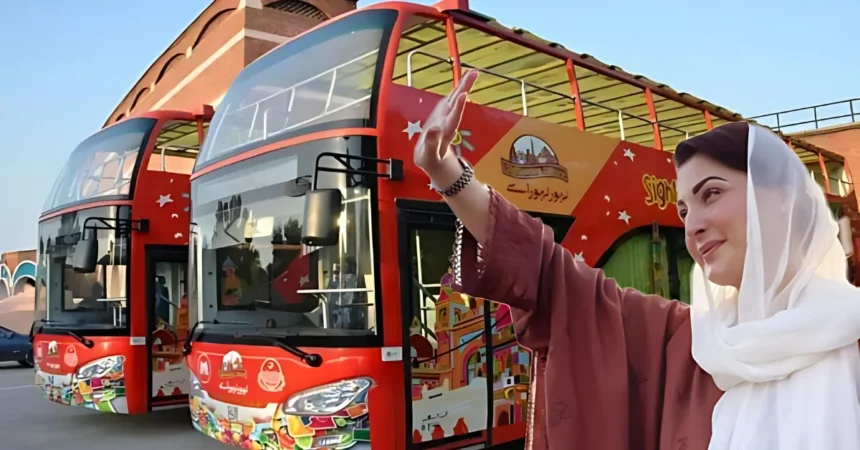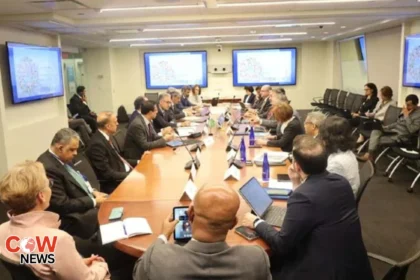In a significant move aimed at enhancing women’s mobility and empowerment, Maryam Nawaz, Vice President of the Pakistan Muslim League-Nawaz (PML-N), inaugurated the Chief Minister (CM) Transport Programme for Women in Punjab on October 7, 2024. This initiative is designed to provide safe, reliable, and affordable transportation options for women across the province, addressing the critical challenges they face in commuting and accessing essential services.
The Context of Women’s Mobility in Punjab
Punjab, the most populous province of Pakistan, is home to millions of women who play crucial roles in various spheres of life, including education, healthcare, and the workforce. However, despite their contributions, women in Punjab often encounter numerous barriers when it comes to mobility. Factors such as inadequate public transport options, safety concerns, and societal norms restrict their freedom to travel.
According to various studies, only a small percentage of women in Punjab have access to reliable transportation. Many rely on family members or unsafe modes of transport, which can lead to missed educational opportunities and limited access to employment. The CM Transport Programme aims to tackle these issues head-on. By providing a dedicated transport system for women, the initiative seeks to create an environment where women can move freely, pursue education, and participate actively in the workforce without fear or hindrance.
Key Features of the CM Transport Programme
The CM Transport Programme for Women is a comprehensive initiative that includes several key features designed to cater specifically to the needs of female commuters:
Dedicated Transport Services: The programme will introduce women-only buses and vans operating on major routes, ensuring that female passengers have access to safe and comfortable transportation. These vehicles will be easily identifiable, making them more secure for users.
Affordability: Recognizing the economic constraints faced by many women, the transport services will be offered at subsidized rates, making them accessible to a broader demographic. The government has committed to keeping fares low to encourage maximum usage.
Safety Measures: All vehicles will be equipped with safety features, including GPS tracking and emergency response systems. Trained female staff will be on board to assist passengers and ensure a secure travel experience. Each vehicle will also be monitored in real-time to ensure safety and prompt response in emergencies.
Awareness Campaigns: The initiative will include educational campaigns to raise awareness about women’s rights to mobility and promote the use of these dedicated transport services. This will involve community meetings, workshops, and social media outreach to engage with women and encourage them to utilize the services.
Integration with Existing Transport Systems: The CM Transport Programme will work in tandem with existing public transport services to create a more cohesive and efficient transportation network. Collaborations with local transport authorities will ensure that women can seamlessly transition from one mode of transport to another.
Mobile Application: A dedicated mobile app will be developed for this transport initiative, allowing women to schedule rides, track buses in real-time, and provide feedback about their travel experiences. This digital platform aims to enhance accessibility and user satisfaction.
Maryam Nawaz’s Vision for Women’s Empowerment
During the inauguration ceremony, Maryam Nawaz emphasized the importance of women’s empowerment in the development of society. She stated, “Empowering women is not just a matter of social justice; it is essential for economic growth and national development. When women thrive, societies thrive.”
Maryam reiterated that the CM Transport Programme is a step towards bridging the gender gap in mobility, enabling women to access education, healthcare, and employment opportunities. She highlighted the government’s commitment to creating an inclusive society where women can participate fully and equally.
Furthermore, she expressed her belief that such initiatives can serve as a catalyst for broader societal changes. “When women have the means to travel freely, they can change their lives and the lives of their families. This is not just about transport; it’s about empowerment and autonomy,” she stated.
Government Support and Funding
The CM Transport Programme is supported by the provincial government, which has allocated significant resources to ensure its successful implementation. Funding will be directed towards the procurement of vehicles, infrastructure development, and operational costs.
The initiative is part of a broader strategy by the Punjab government to enhance women’s rights and ensure gender equality in all aspects of life. By investing in women’s mobility, the government aims to facilitate their participation in the labor force and promote economic independence. Moreover, the government is working in collaboration with NGOs and women’s rights organizations to ensure that the programme meets the needs of the community effectively.
Anticipated Impact on Women in Punjab
The launch of the CM Transport Programme is expected to have a transformative impact on the lives of women in Punjab. By providing dedicated transport services, the initiative will:
Increase Access to Education: Many young girls face challenges in commuting to school due to safety concerns and lack of reliable transport. With the introduction of women-only transport services, more girls are likely to attend school, contributing to higher literacy rates among females. This will also encourage parents to send their daughters to school, as safety concerns will be alleviated.
Enhance Employment Opportunities: Women often find it challenging to secure jobs due to transportation issues. The new programme will enable more women to commute to work confidently, ultimately increasing their participation in the workforce. This is particularly crucial for women seeking to enter fields where they have historically been underrepresented.
Promote Healthcare Access: Women frequently bear the responsibility of family healthcare. With improved transport options, they can access medical facilities more easily, ensuring better health outcomes for themselves and their families. Timely medical care will reduce mortality rates and improve overall community health.
Foster Social Engagement: Reliable transport will encourage women to engage in community activities, participate in social events, and take part in decision-making processes, leading to a more active role in society. This increased social engagement can also help build networks and support systems among women.
Economic Empowerment: By facilitating access to job opportunities and education, the transport programme will contribute to the economic empowerment of women. This empowerment can lead to improved standards of living for families and communities, contributing to the overall development of Punjab.
Addressing Concerns and Challenges
While the CM Transport Programme holds immense promise, it is essential to address potential challenges to ensure its success. These include:
Cultural Barriers: Societal norms and attitudes towards women’s mobility may pose challenges to the programme’s acceptance. Awareness campaigns will be crucial in changing perceptions and encouraging women to utilize these services. Engaging community leaders and influencers will also help in shifting mindsets.
Operational Efficiency: Ensuring that the transport services run on time and are well-maintained will be vital for gaining public trust. Continuous monitoring and feedback mechanisms should be established to address any operational issues promptly. The government plans to establish a dedicated task force to oversee the programme’s implementation.
Safety and Security: Maintaining the safety of female passengers should be a top priority. The government must implement strict safety protocols and regularly train staff to handle emergencies. Collaborations with law enforcement will be essential to ensure safe transit for women.
Public Awareness: Effective communication strategies will be needed to inform women about the services offered. This includes leveraging social media, community radio, and public service announcements to reach a wider audience.
Community Involvement and Feedback
To maximize the programme’s effectiveness, community involvement and feedback will be essential. The government plans to engage local communities in the planning and implementation phases, ensuring that the services meet the specific needs of women in different areas.
Regular surveys and feedback mechanisms will be established to gauge public perception and gather insights for improvements. By actively involving women in the decision-making process, the programme can remain responsive to their evolving needs. Workshops and focus groups will be organized to facilitate discussions on how the programme can better serve its users.
Success Stories from Other Regions
The CM Transport Programme is not an isolated initiative. Similar programs in other countries have demonstrated the positive impact of dedicated transport services for women. For instance, in several cities in India, women-only buses have significantly improved women’s mobility, resulting in higher participation in education and employment.
Such success stories serve as inspiration for the Punjab government, showcasing that investing in women’s mobility can lead to transformative changes in society. The Punjab government is closely monitoring these case studies to learn best practices and avoid potential pitfalls.
Long-Term Vision for Women’s Mobility
The launch of the CM Transport Programme is just the beginning. The Punjab government envisions a long-term strategy for women’s mobility that encompasses various facets, including infrastructure development, public awareness campaigns, and continuous evaluation of services.
Future plans include expanding the programme to cover rural areas where transportation options are particularly limited. This will require collaborations with local governments and organizations to ensure that the needs of rural women are met effectively.
Additionally, the government aims to integrate technology into the transport system, enabling features such as cashless payments, real-time tracking, and enhanced customer support services.
The inauguration of the CM Transport Programme for Women by Maryam Nawaz marks a significant milestone in the journey towards gender equality in Pakistan. By addressing the critical issue of women’s mobility, this initiative has the potential to empower countless women across Punjab, enabling them to pursue their dreams and contribute to society more effectively.
As the programme rolls out, it will be closely monitored to assess its impact and effectiveness. With strong government support, community involvement, and a commitment to continuous improvement, the CM Transport Programme can serve as a model for similar initiatives in other regions, ultimately leading to a more equitable and inclusive society for all.
#MaryamNawaz #WomenEmpowerment #CMTTransportProgramme #Punjab #GenderEquality #SafeTransport #WomenInPakistan #EmpowerWomen #PublicTransport #WomenRights







